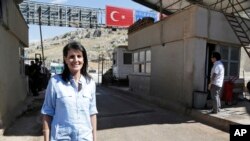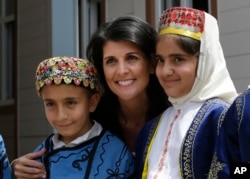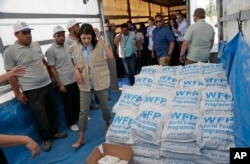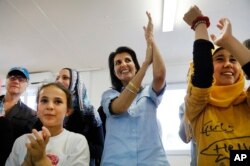President Donald Trump's U.N. envoy set foot Wednesday in the no-man's-land between Syria and Turkey, witnessing the precarious transfer of aid supplies into a seemingly interminable conflict. That reality is far removed from America's years-old hope for President Bashar Assad to leave power and speedily end the civil war.
From the Syrian side of the border zone, Ambassador Nikki Haley gazed up at a Turkish flag plastered onto signs marking the entrance into that nation's territory. Syrian refugees once flooded through the run-down Bab al-Hawa Border Crossing until officials cracked down. These days it's only aid convoys that pass back and forth, trying to meet an unrelenting demand for food, health supplies and other basic needs in the Arab country.
Ferried to the border in an armored motorcade, Haley walked to within just a few feet of entering the Arab land, becoming the highest-ranking U.S. official to come so close to Syrian territory in years. Underscoring the danger, security officials spirited her away from the border after unmarked vehicles were spotted moving toward the area.
Beyond the frontier, she confronted a human reminder of the world's failure to resolve the war: About 8,400 Syrian refugees in a Turkish refugee camp, some of them stuck there for more than five years.
Haley brings ‘new life’ to efforts to help refugees
The dominant theme of Haley's trip this week to Jordan and Turkey was the need to retool the global approach to meet the needs of Syrians stuck in a protracted conflict now in its seventh year. Haley said she wanted to “bring new life” to efforts to help the refugees, mentioning schooling and training in particular.
“The things they are learning here, you want them to be able to pick it up and do it there,” Haley said. ``How do you strengthen them and don't let them stand still?''
Though many more refugees have rebuilt their lives in cities, the camps stand as evidence of the failure to resolve a war that has killed hundreds of thousands, sparked worldwide terror and migration crises, and destabilized much of the Middle East. Once envisioned as a temporary solution, they seem increasingly permanent, filled with children who recall no life before the camps.
There have been growing concerns about a “lost generation” of Syrians growing up outside their home country, their worlds defined by the conflict. Many are receiving no education, health care or other basic necessities.
To that end, Haley and other U.S. officials have encouraged Syria's neighbors, who've absorbed the majority of the millions of refugees, to treat them less like visitors and more like locals, living, working and studying among the regular population. But it is a request that increases demands on the host nations' already-beleaguered infrastructures and limited resources. And it comes as the Trump administration is proposing severe cuts in U.S. assistance for overseas refugees and programs targeting children in need.
‘US is very much going to take charge’
Six years on since the United States first called on Assad to go, his hold on power serves as a bitter indictment of failed efforts to end the war.
Having blamed former President Barack Obama for letting the crisis fester, Trump says he is increasing engagement. The administration announced it will arm Syrian Kurds fighting the Islamic State group, a step the Kurds long implored Obama to take. And Trump ordered airstrikes on a military base belonging to Assad's military after accusing it of using chemical weapons.
“You've seen that they've actually militarily continued to look at Syria and when and if there's going to be a role there,” Haley said, referring to the Trump administration. “Just like with the chemical weapons ... the U.S. is not going to sit back and let others deal with it. The U.S. is very much going to take charge if they need to, if they see something being done that's wrong to the people of Syria.”
But on the peace front, the U.S. has spearheaded no new effort, and Trump's overall approach has not deviated dramatically from his predecessor's. Obama, too, relied on Kurdish forces to do the toughest fighting. And Obama, like Trump, tried repeatedly to engage with Russia — Assad's strongest ally — to facilitate talks that could yield a political resolution.
US unsure on Russia-led safe zones plan
Trump's young administration has struggled to determine whether to embrace or reject a deal struck by Russia, Turkey and Iran to create four safe zones in Syria where Assad's forces and the Syrian opposition would stop fighting. Not only is the U.S. not a party to the deal, undermining America's role as a key mediator in the conflict, but the involvement of Iran — another Assad backer — has fueled U.S. skepticism.
Haley said the U.S. would “look at the opportunities” in the Russia-led deal, but intended for the ultimate resolution to come through stalled U.N.-led talks.
At the Syrian border, Haley pitched in by helping pack boxes of lentils, bulgur wheat and sugar set to be trucked through Bab al-Hawa. Aid workers explained how goods are transferred in the no-man's-land from Turkish trucks onto Syrian trucks before making the journey deep into Syria.
And at Altinozu Refugee Camp, Haley sought to showcase how refugees were trying their best to live full lives under the bleakest of conditions. She cooed over a refugee baby in the camp's clinic awaiting a medical examination, and took to the soccer field with young Syrians to kick a few balls toward the goal.








